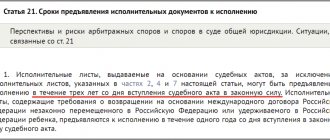So, the trial in the case of non-payment of financial obligations has been completed, and a writ of execution has been received. What to do next is a question that concerns both the plaintiff and the defendant: now debt collection can pass into the hands of official bodies represented by bailiffs. But for this to happen, the plaintiff must take certain actions: the writ of execution itself does not initiate proceedings. Don’t worry: the situation seems difficult, but, like almost any difficulty, there is a way out. Let's talk about what to do after receiving IL and how to get out of the situation in the most reasonable way.
What is a writ of execution
First, it’s worth understanding what a writ of execution is. This is a document that is issued by the court after it makes a decision on the case. Depending on which specific authority issued the IL, its form may vary, but the essence remains the same: it is a legal confirmation of a court decision. It describes the requirements that the defendant must fulfill in accordance with the court's verdict. As a rule, we are talking about paying the plaintiff money: this means not only loans and other obligations that were not fulfilled on time, but also, for example, compensation for moral and physical harm.
Installment and deferment of execution
The debtor may ask for an installment plan or deferment of execution. And even if the claimant is not against it, such an agreement must still be certified in court. The decision will be positive if the claimant does not raise any objections. After receiving the decision, the bailiff issues a corresponding resolution, and coercive measures are temporarily not applied to the debtor. And here, again, there is no point in taking the writ of execution into your hands. And there will be no problems with re-execution. After the end of the deferment period, the bailiff will automatically begin proceedings in the case.
Return to the section Support by a lawyer in enforcement proceedings
What happens after receiving IL
The plaintiff receives the writ of execution. This happens as soon as the court decision comes into force, sometimes immediately after the hearing. Occasionally, the court immediately transfers the IL into the hands of the bailiffs, but this rarely happens, especially when it comes to loans. As a rule, the sheet ends up in the hands of the plaintiff - the creditor. This document allows you to open enforcement proceedings and begin the procedure for collecting the required amount from the borrower. It is valid for three years from the moment the court decision enters into legal force: during this time you should contact the relevant authorities.
An example of a statement to a bailiff
To the bailiff of
the OSP for the Primorsky district
Arkhangelsk region
Claimant: Startsev Vyacheslav Alexandrovich,
address: 163035, Arkhangelsk, st. Revolutions, 222, apt. 18,
within the framework of enforcement proceedings
№ 23423/21/2021
Application for revocation of a writ of execution
In the proceedings of the OSP in the Primorsky District No. 23423/21/2021 dated November 12, 2021, based on the writ of execution, series FS No. 458795. Issued by the Primorsky District Court of the Arkhangelsk Region on October 15, 2021 on a claim for alimony for the maintenance of a former spouse. Debtor - Demchenko Olesya Sergeevna.
In accordance with Art. 46 of the Law on Enforcement Proceedings, the writ of execution is returned at the request of the claimant.
In connection with reaching an agreement with my ex-wife, I intend to present the writ of execution to the debtor’s employer for execution in accordance with Art. 9 of the Law on Enforcement Proceedings. I have no claims regarding debt.
Based on the above, guided by art. 46 of the Federal Law “On Enforcement Proceedings”,
Ask:
- Return to the claimant the writ of execution, series FS No. 458795, issued by the Primorsky District Court of the Arkhangelsk Region on October 15, 2021, without further execution.
Startsev V.A. 12/18/2021
Where does the plaintiff apply?
The plaintiff is free to independently choose how to dispose of the received writ of execution. He can send it to the Federal Bailiff Service (FSSP) to initiate enforcement proceedings, as well as contact the defendant’s place of work or the organization where his accounts are opened. Let's consider each of the three options separately.
In the FSSP
Most often, the plaintiff applies to the Federal Bailiff Service at the place of registration of the defendant, providing a writ of execution and an application to initiate enforcement proceedings. If the debtor is a legal entity, you will also need an extract from the Unified State Register of Legal Entities. In some cases, you may need other papers that can speed up the process: for example, information about the defendant’s financial situation and whether he has property that can be sold. Sometimes the plaintiff may request that the defendant's property be seized. After this, the bailiffs will initiate enforcement proceedings and begin the collection procedure.
To a financial institution
The plaintiff can try to collect the funds on his own by contacting the bank where the defendant’s accounts are opened. This can only be done if there is information that the borrower has an open account with this particular financial institution. A statement must also be attached to the writ of execution. As a rule, if the documents are drawn up correctly, the bank does not have the right to refuse to write off funds from the defendant’s accounts.
At the defendant's place of work
If the amount of debt does not exceed 100 thousand rubles, the plaintiff can also contact the organization where the defendant works and demand to recover funds from his salary. In this case, the writ of execution is sent by registered mail with notification of receipt, with details attached for transferring the amount of debt. However, this and the previous options are used less often than contacting the FSSP. As a rule, it is easier for the plaintiff to send a writ of execution to the bailiffs, so that they themselves carry out the collection procedure, contact the defendant at work or at the institution where his accounts are opened. If the plaintiff is a bank or other financial organization, then sometimes it entrusts the collection to its lawyers, but even in this case, enforcement proceedings are the most likely outcome of the situation.
Change of place of performance
Proceedings under a writ of execution are initiated at the place of its execution. But the debtor can change his place of residence, place of work or location of property. And then it will be necessary to change the bailiff. It is not necessary to collect the writ of execution from the bailiff. This issue is resolved by the bailiff service without the participation of the claimant. The proceedings in the case by the previous bailiff are closed, and the writ of execution itself is sent to the new place of execution, where a new proceeding is opened.
What should a borrower do after initiating an IP?
The question of what the debtor should do after the initiation of an IP is especially acute. Understandably, this can cause anxiety and even panic. However, you shouldn’t worry too much: yes, enforcement proceedings are an unpleasant process, but you can cope with it if you approach the issue responsibly. If the FSSP sees that the debtor is making contact and agrees to voluntarily pay the obligations, then the issue will most likely be resolved without serious consequences. But hiding and concealing your location is not the best option: bailiffs have the right to block a person from traveling abroad, and in some cases, even put him on the wanted list.
Get in touch
The first thing to do is to try to contact the Federal Bailiff Service as quickly as possible and clarify the situation. This may allow you to avoid seizure of property and other measures that are used forcibly.
- Be sure to clarify on the basis of which document the enforcement proceedings were initiated. This is important to better understand the specifics of the situation.
- By law, you are required to obtain copies of enforcement documents at your place of residence or registration. If this does not happen, you should request them again.
You should communicate with bailiffs calmly, in a neutral and respectful tone. Don't panic: the influence of strong emotions can prevent you from thinking and acting rationally. It is better to calm down first and then take any action.
Reach an agreement
If a person is cooperative and ready to negotiate the timing and amount of payments, then the risk that any additional sanctions will be applied to him is reduced. Clarify your financial situation to the bailiffs and express your desire to repay the debt within the time frame within which you can do so. Discuss possible options and repayment schemes: there are often cases when bailiffs take into account the financial situation of the defendant and offer him feasible repayment terms. If you refuse, the FSSP has the right to apply sanctions or forcibly collect the debt by selling the property at auction. Of course, the powers of the bailiffs do not allow them to sell what is necessary for your life, for example, some household appliances. But the loss of property is in any case unpleasant, especially considering that at auction it is usually sold at a reduced price.
Finish the IP as soon as possible
Remember: the sooner the enforcement proceedings are completed, the sooner the restrictions that the bailiffs may impose on you will be lifted. The list of their powers is quite wide: arrest of accounts, inventory of property and a ban on traveling abroad. This is not fatal, but it can cause some inconvenience - it is better not to delay it. Don't be afraid: if the FSSP sees that you are ready to cooperate, it will negotiate with you, and in the end you can reach a compromise decision on the payment schedule. In addition, the sooner you deal with enforcement proceedings, the sooner you can start adjusting your credit history associated with overdue debt.
When and how enforcement proceedings are terminated
Lawyer Antonov A.P.
The court or the bailiff can terminate enforcement proceedings, depending on the grounds for termination. There are many such reasons. Some are associated with the withdrawal of a party to enforcement proceedings, others with the impossibility of execution. Proceedings may also be terminated when there is no longer a need for compulsory execution or the documents that form the basis of the proceedings are no longer valid. The court terminates enforcement proceedings at the request of the bailiff or one of the parties. The bailiff does this at the request of one of the parties or independently after receiving documents confirming that there is a basis for termination.
1. On what grounds is enforcement proceedings terminated ? The grounds listed in the law can be conditionally divided into several groups. Let's take a closer look at them. 1.1. The withdrawing party cannot be replaced. These are situations when: 1) the citizen - the collector or the debtor - has died. Usually in such cases, succession occurs: the place of the deceased in enforcement proceedings is taken by his heir (Part 1 of Article 52 of the Law on Enforcement Proceedings). But sometimes the rights (responsibilities) cannot pass to the heirs and cannot be implemented by the trustee appointed by the guardianship and trusteeship authority. In such cases, enforcement proceedings are terminated by the court (clause 1, part 1, article 43 of the Law on Enforcement Proceedings);
2) the organization that is a party to the enforcement proceedings is excluded from the Unified State Register of Legal Entities. In this case, the proceedings are terminated by the bailiff (clause 7, part 2, article 43 of the Law on Enforcement Proceedings).
1.2. Documents ceased to be valid - grounds for enforcement proceedings The bailiff terminates enforcement proceedings if: 1) the executive document on the basis of which enforcement proceedings were initiated is canceled or declared invalid (clause 5, part 2, article 43 of the Law on Enforcement Proceedings); 2) the judicial act on the basis of which the executive document was issued was canceled (clause 4, part 2, article 43 of the Law on Enforcement Proceedings); 3) the court adopted an act to terminate the execution of the enforcement document issued by it (clause 1, part 2, article 43 of the Law on Enforcement Proceedings); 4) the execution of the act in the case of an administrative violation was terminated by the court (another body, official) that issued the executive document, on the grounds and in the manner established by federal law (Clause 6. Part 2 of Article 43 of the Law on Enforcement Proceedings).
1.3. There is no possibility of executing an executive document . The court terminates enforcement proceedings if the possibility of executing an executive document obliging the debtor to perform certain actions (refrain from performing certain actions) is lost (Clause 2, Part 1, Article 43 of the Law on Enforcement Proceedings). The bailiff terminates the proceedings on the following grounds: 1) if the child who was illegally moved to Russia or kept in it has reached a certain age. This concerns demands for the return of the child (exercise of rights of access to him) on the basis of an international treaty of the Russian Federation, when the child has reached the age at which such an agreement is not valid for him (Clause 8, Part 2, Article 43 of the Law on Enforcement Proceedings); 2) arrears in payments to the budget were recognized in accordance with the procedure established by law as hopeless for collection (clause 10, part 2, article 43 of the Law on Enforcement Proceedings); 3) the executive document contains a requirement for the collection of state duty in a case considered by the court on the collection of debt on payments to the budget and this debt is recognized in accordance with the procedure established by law as hopeless for collection (Clause 11, Part 2, Article 43 of the Law on Enforcement Proceedings).
1.4. There is no longer a need for compulsory execution Enforcement proceedings are terminated by the court due to the fact that there is no need for compulsory execution when: 1) the claimant refuses to receive the thing seized from the debtor in accordance with the enforcement document (clause 3. part 1 of article 43 of the Law on enforcement proceedings); 2) the documents specified in Part 2 of Art. 45 of the Law on Enforcement Proceedings, for example, an act in a case of an administrative offense (clause 4, part 1, article 43, part 2, article 45 of the Law on Enforcement Proceedings). The bailiff terminates the proceedings if: 1) the claimant refused to collect and the court accepted this refusal (Clause 2, Part 2, Article 43 of the Law on Enforcement Proceedings); 2) alimony obligations ceased due to the child reaching the age of majority or acquiring full legal capacity (clause 9. part 2 of article 43 of the Law on Enforcement Proceedings); 3) the claimant and the debtor entered into a settlement agreement (reconciliation agreement), and the court approved this agreement (Clause 3, Part 2, Article 43 of the Law on Enforcement Proceedings); 4) the obligation of the borrower-individual to the creditor-mortgagee terminated by virtue of clause 5 of Art. 61 of the Law on Mortgage (clause 12, part 2, article 43 of the Law on Enforcement Proceedings). 2. How the court terminates enforcement proceedings To begin the procedure for termination of enforcement proceedings, you need to submit an application to the court. This can be done by either party or the bailiff. The court will consider your application within ten days (part 1 of article 440 of the Code of Civil Procedure of the Russian Federation, part 3 of article 327 of the Arbitration Procedure Code of the Russian Federation, part 3 of article 359 of the CAS RF). If the court recognizes that there is a basis for terminating enforcement proceedings, it will issue an appropriate ruling and send it to the parties and the bailiff who is in charge of executing the executive document (Part 2 of Article 440 of the Code of Civil Procedure of the Russian Federation, Part 3 of Article 327, Part 2 of Art. 324 Arbitration Procedure Code of the Russian Federation, Part 3, Article 359, Part 2, Article 358 CAS RF). You can appeal the court's ruling to terminate enforcement proceedings, as well as the ruling to refuse termination (clause 33 of the Resolution of the Plenum of the Supreme Court of the Russian Federation dated November 17, 2015 N 50). 3. How a bailiff terminates enforcement proceedings When grounds for termination arise, the bailiff who conducts enforcement proceedings must himself terminate it. But we recommend that you contact him with a corresponding application, since in practice this speeds up the process. This right of the parties to enforcement proceedings is provided for by law (Part 4 of Article 45 of the Law on Enforcement Proceedings). Your application must be submitted to the bailiff no later than the day following the day it was received by the bailiff department. Within three days from the date of receipt of the application, the bailiff must terminate the proceedings and issue an appropriate resolution, which is approved by the senior bailiff or his deputy (Part 4 of Article 45 of the Law on Enforcement Proceedings). Within the same period, the bailiff must terminate the proceedings after he has received documents that confirm the emergence of grounds for termination of enforcement proceedings (Part 4 of Article 45 of the Law on Enforcement Proceedings). If the act of termination of enforcement proceedings is adopted by a court, other body or official, the bailiff executes it immediately after receipt (Part 5 of Article 45 of the Law on Enforcement Proceedings). 4. Is it possible to terminate enforcement proceedings in part? The Law on Enforcement Proceedings does not directly provide for partial termination of enforcement proceedings, but at the same time it does not contain provisions excluding such a possibility. In practice, enforcement proceedings are partially terminated when the grounds for termination relate only to part of the requirements specified in the enforcement document. For example, this is possible when the judicial act on the basis of which the writ of execution was issued is canceled in part. For example, the court decided to collect debts and losses from the defendant, a writ of execution was issued and enforcement proceedings were initiated. And then the higher court overturned the said decision regarding the recovery of damages. In such a situation, the bailiff will terminate enforcement proceedings in the relevant part (clause 30 of the Resolution of the Plenum of the Supreme Court of the Russian Federation of November 17, 2015 N 50).
Sincerely, lawyer Anatoly Antonov, managing partner of the law firm Antonov and Partners.
Still have questions for your lawyer?
Ask them right now here, or call us by phone in Moscow +7 (499) 288-34-32 or in Samara +7 (846) 212-99-71 (24 hours a day), or come to our office for a consultation (by pre-registration)!
Grounds for revocation
The law does not require the reasons for the revocation to be stated. No one has the right to force or influence the decision to withdraw. This is the exclusive expression of the will of the claimant.
At the initiative of the claimant
Most often, the motive for revocation at the initiative of the claimant is personal sympathy, family relationships or an agreement on compensation or additional benefits if payments are made voluntarily. Most often this is due to the official position of the debtor (especially for alimony), who does not want outsiders to know about the IL sheet. In addition to those listed, the claimant may have other motives. He is not obliged to state them.







